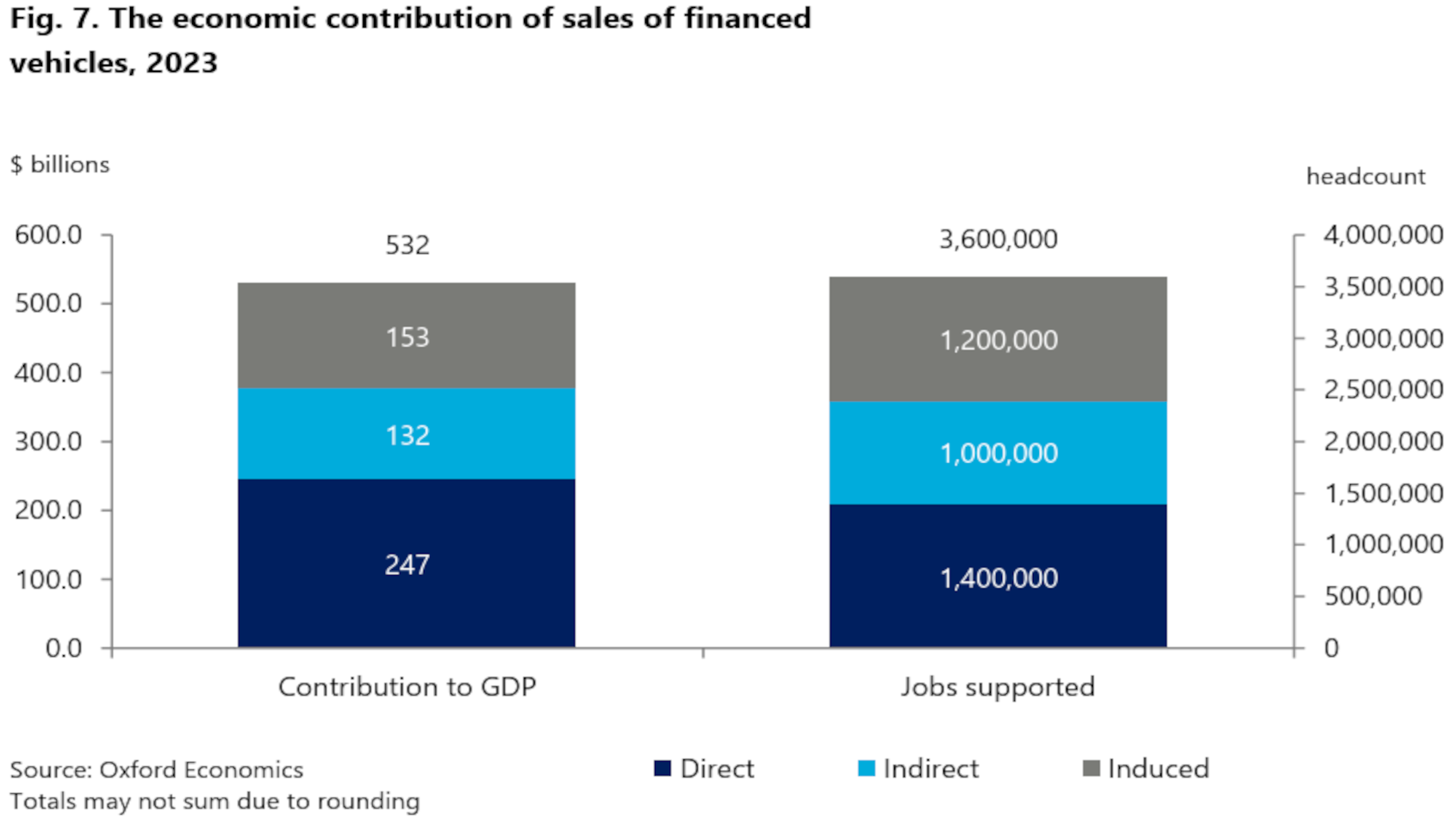AFSA & Oxford Economics: Vehicle financing provides $125.5B boost to US GDP

Chart courtesy of the American Financial Services Association.
By subscribing, you agree to receive communications from Auto Remarketing and our partners in accordance with our Privacy Policy. We may share your information with select partners and sponsors who may contact you about their products and services. You may unsubscribe at any time.
New research released by the American Financial Services Association (AFSA) on Monday highlighted how much vehicle financing fuels the U.S. economy.
AFSA and Oxford Economics found that vehicle-finance providers contributed $125.5 billion to U.S. GDP in 2023, equivalent to $17 for every $100 in loans originated.
Researchers said the sector supported about 680,000 full-time equivalent jobs and generated $24.6 billion in tax revenue — including $16.3 billion federally and $8.3 billion to states and localities.
Financial institutions originated 30.2 million vehicle loans and leases worth $727 billion in 2023, according to the report.
“The spillover effect of vehicle sales and financing is significant across the United States and extends well beyond the vehicle manufacturers, dealers and lenders,” AFSA chief economist Tim Gill said in a news release, noting that the processes help millions of households purchase cars essential for work and family life.
“At every level of the vehicle, dealer and lender supply chain, there are communities, businesses large and small and consumers who both directly and indirectly benefit economically,” continued Gill, who is among the speakers at Used Car Week, which is Nov. 17-20 in Las Vegas.
Subscribe to Auto Remarketing to stay informed and stay ahead.
By subscribing, you agree to receive communications from Auto Remarketing and our partners in accordance with our Privacy Policy. We may share your information with select partners and sponsors who may contact you about their products and services. You may unsubscribe at any time.
In the report, researchers drilled deeper into the data revealing the employment impact of vehicle financing.
Researchers estimated vehicle financing in 2023 supported approximately 680,000 full-time equivalent (FTE) jobs across the United States. They found that vehicle finance providers directly supported 210,000 FTE US jobs, representing 31% of the total FTE jobs.
They then estimated their spending on goods and services supported another 200,000 FTE jobs along the supply chain, which equates to 30% of the total employment impact, while wage-induced spending supported an additional 260,000 FTE jobs through induced effects, representing 39% of the total
The report pointed out that one FTE job represents the equivalent of one person working a standard 40-hour week for a year.
After reiterating that vehicle finance originations totaled around $727 billion in 2023, researchers said, “The activities involved in providing this financing — including financial institution operations to provide funding and their associated expenditures with suppliers, and wage-induced effects — are projected to significantly contribute to the U.S. economy in the years that follow.
Personal lending also examined
In its companion report, AFSA found that personal lending to consumers contributed $20.4 billion to U.S. GDP in 2023, supported 159,000 jobs, and generated $4.9 billion in tax revenue.
The report pointed out finance companies originated 12.5 million personal loans worth $62 billion, many serving lower-income and subprime borrowers who often lack access to traditional bank credit.
The two studies — The Economic Impact of Vehicle Financing in the U.S. and The Economic Impact of Personal Lending by Finance Companies — showed that vehicle financing and personal lending by finance companies together add more than $145 billion annually to the U.S. economy and support nearly 840,000 jobs nationwide.
AFSA president and CEO Celia Winslow explained the project with Oxford Economics highlighted how responsible consumer lending drives access to credit, supports household mobility, and fuels economic growth and activity across all 50 states.
“These findings reaffirm that responsible consumer lending doesn’t just help individuals access the credit they need in communities across America – it powers the broader economy with more than $145 Billion impact annually and support 840,000 jobs,” Winslow said in the news release.
“From putting families on the road to helping consumers meet life’s everyday expenses, our members keep the American economy moving,” Winslow went on to say.
Texas and California see largest economic impacts
Across both studies, Texas and California experienced the greatest total economic benefits from vehicle financing and personal lending activity.
The research found that these two states combined to capture more than $36 billion in GDP impact — $21.3 billion in Texas and $15.3 billion in California.
AFSA also indicated that 40% of the total value of vehicle financing was issued in Texas, California, Florida, New York, and Georgia. On a per-capita basis, the states with the highest amount of vehicle loans were Texas, Florida, and New Hampshire.
Regarding personal lending, researchers said 13% of the value of personal loans provided by finance companies across all 50 states was issued in Texas.
AFSA said the report attributed these concentrations to “strong consumer demand, large vehicle markets, and well-developed financial services industries within these states.”


